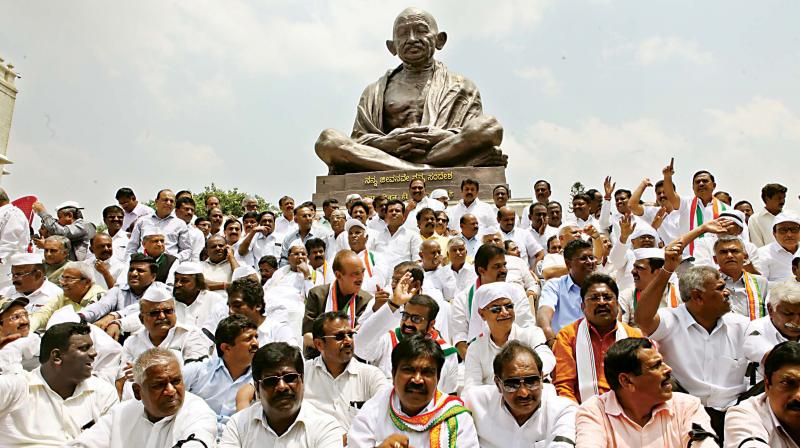BJP on a roll, but where will BS Yeddyurappa's exit lead?
Firstly, the good performance by the BJP would have surely boosted the morale of the party workers.

The Karnataka election has received national attention simply on account of the wider national implications of the verdict. An Assembly without any single party securing a clear majority has resulted in a political drama with each day producing an interesting twist and a surprising turn. With the Governor privileging the claims of the BJP over the JDS-Congress alliance, the Supreme Court has now directed a floor test on the evening of 19th May. What are the larger national ramifications of the Karnataka verdict?
Firstly, the good performance by the BJP would have surely boosted the morale of the party workers. While a clear majority eluded them, their emergence as the single largest party places them at a decisive advantage. In a direct fight, they have been able to unseat a ruling Congress government in every state election since 2014. Electoral trends in Karnataka are clearly indicating that the last week of the campaign decisively tilted the balance in the favour of the BJP. This last week saw the Prime Minister invest five days in campaigning and appears to have swung the tide in the parties favour. It thus becomes clear that the Prime Minister is the ‘star’ campaigner and maybe the ‘chief communicator’ of the party. By implication, in the Assembly elections to be held later this year and the Lok Sabha elections scheduled next year, the party would heavily depend on the charisma of the Prime Minister to swing a verdict in their favour.
The BJP appears to have also benefitted from its meticulous organization at the ground level. Prakash Jha has rightly called it the ‘Amit Shah School of Election Management.’ The role of the party organization at the ‘booth level’ especially around polling day, to get the voters to the polling booths and exercise their franchise possibly explain the sharp rise in the voter turnout across the state. The voter turnout did not show any increase in Bengaluru city and incidentally the BJP did not come up with a good performance here. This could have eventually been the key factor that deprived them of a majority in the State Assembly.
Thus as the party prepares to defend its three state governments in Madhya Pradesh, Rajasthan and Chattisgarh, it would want to take the momentum of the Karnataka performance logically forward and create the necessary ground work for next year’s Lok Sabha elections. The Karnataka verdict places the BJP at a decisive advantage.
Secondly, what is the impact of the Karnataka results on the Congress party? A victory in Karnataka was important to stem the rising tide of defeats and deny the BJP its right to claim that the polity was moving towards a ‘Congress free India’. By losing Karnataka, the Congress seems to have lost the moral advantage of staking any claim to leading an anti-BJP coalition at the national level. While the Congress President Rahul Gandhi was active in the Karnataka campaign, he does not appear to have delivered on the ground and in the Modi-Rahul leadership ‘sweepstakes’, he is way behind the Prime Minister. While the Congress strategy of empowering state level leaders may have worked, the need for a national face that can garner votes for the party seems equally critical. The state elections in North India will be a test of whether the Congress President can back the right state level leaders and also himself contribute to expanding the party vote share in the state.
What is of equally critical significance is the politics of government formation in the state? When it became increasingly clear that no party was likely to secure a majority, the Congress acted swiftly and lent its support to the JDS to stake claim for Chief Ministership. This in a way was an important step to bring together anti-BJP forces and there was talk of this alliance being taken forward in the 2019 Lok Sabha polls. The decision of the Governor to invite the BJP to form the government and the direction of the court asking Chief Minister Yeddyurappa to prove his majority by this evening at 4pm, places the BJP is an important dilemma. While they were keen to come to power, in order to retain power and ‘manufacture’ a majority they would need to encourage Congress and JDS MLAs to resign their seats or abstain from voting or even align with them (BJP) during the confidence vote. Any such move, which looks inevitable in order to remain in power, would impact on the image of the party and its leadership.
Would it be courageous enough to adopt the route that Atal Bihari Vajpayee took in 1996, of resigning before the actual vote conceding that he did not have the numbers? That act of Vajpayee won both him and the BJP support and admiration and was instrumental in their success in the elections held in 1998. Would it be power at any price or accepting the fact that they do not enjoy a majority and gracefully withdrawing and thus earning for the party an important political dividend that can be encashed in the year ahead? We need to wait for a few hours for that answer.
Dr Sandeep Shastri is Pro Vice Chancellor, JAIN - a Deemed to be University,

